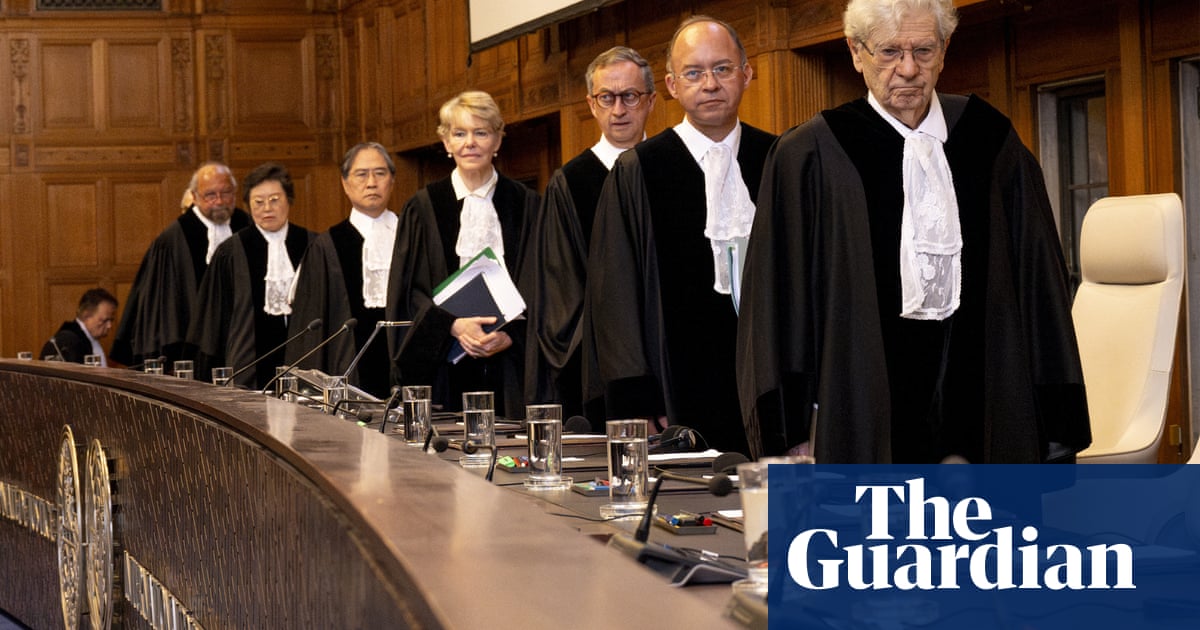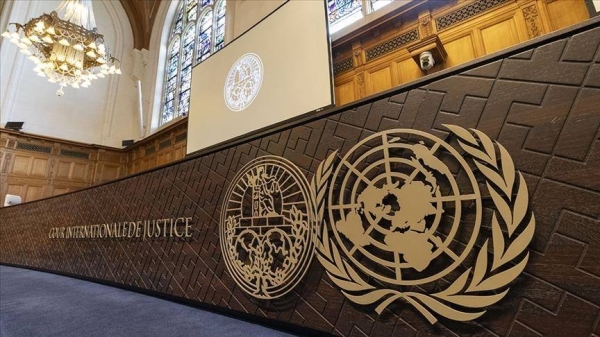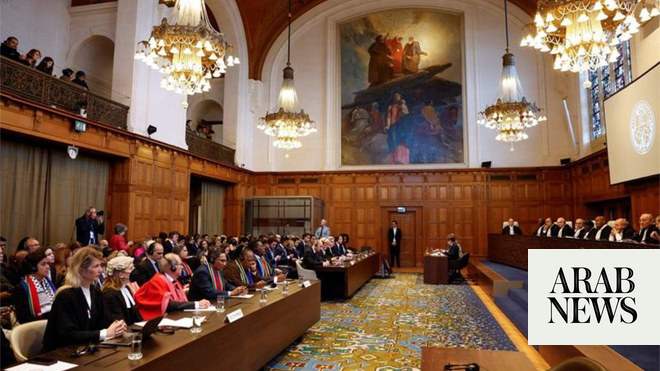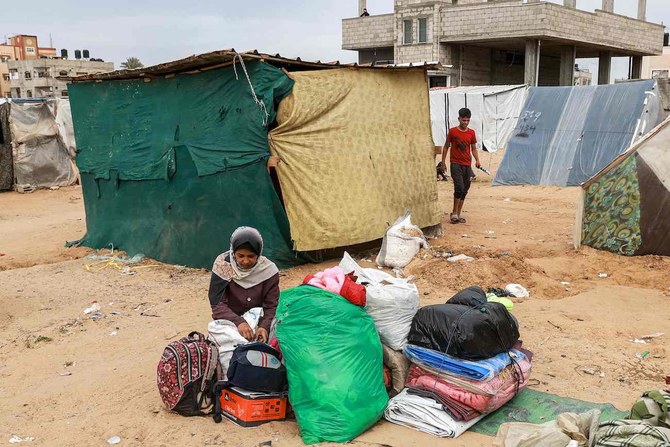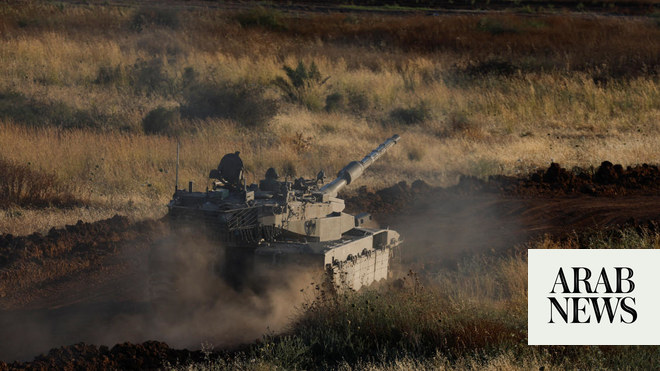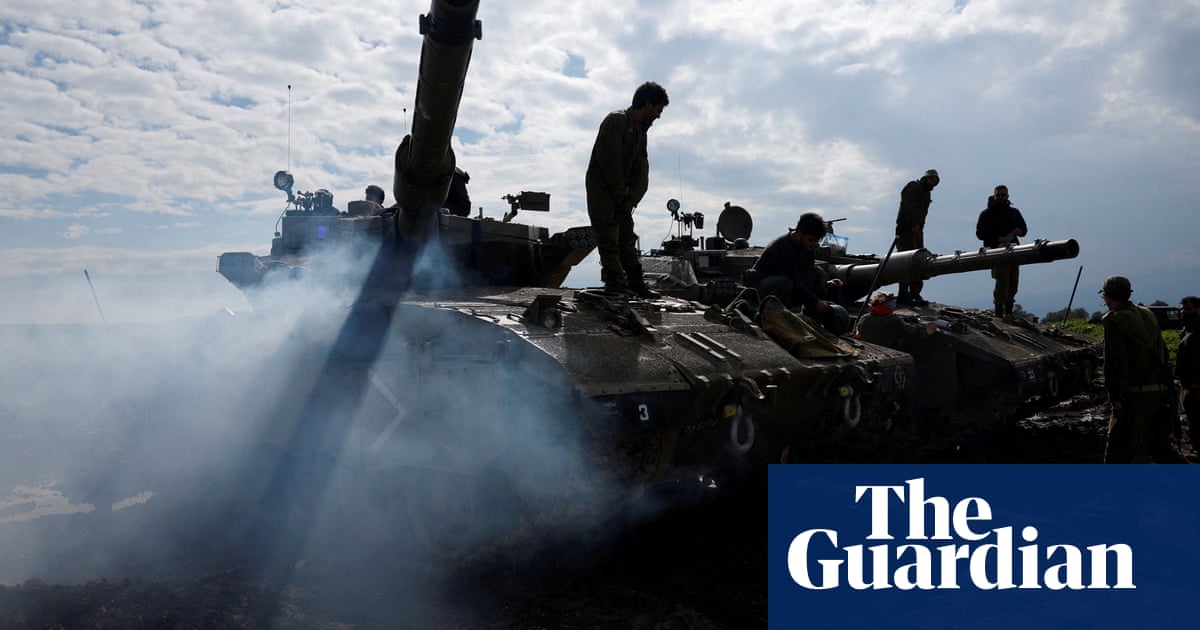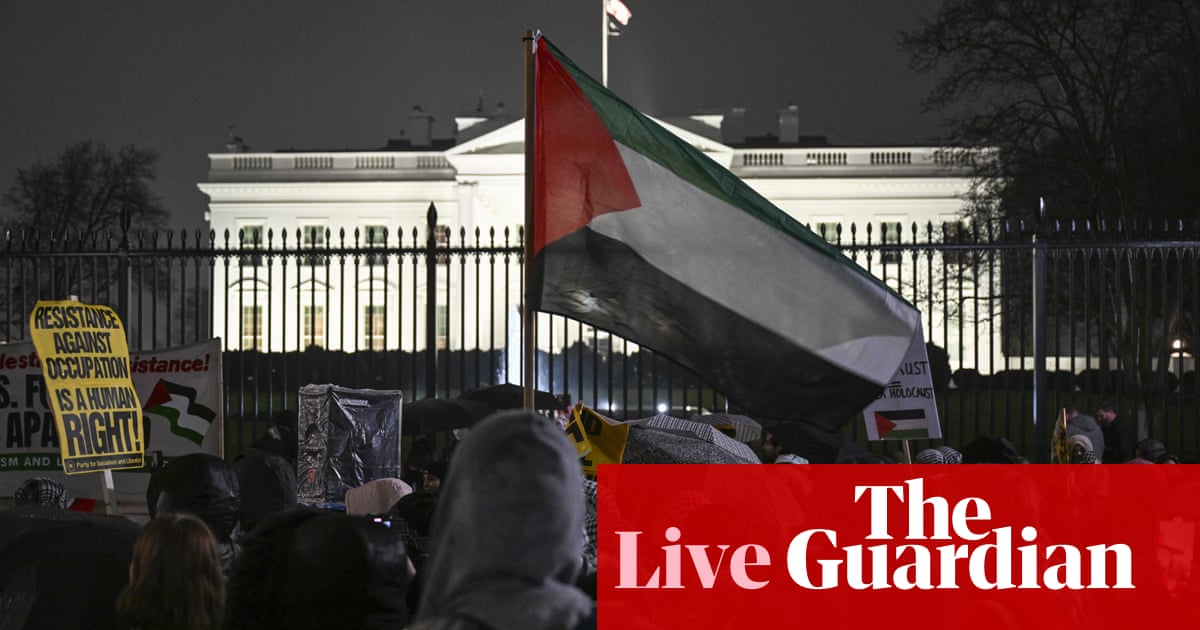
South Africa makes urgent request for ICJ to consider Rafah intervention
South Africa has made an urgent request to the International Court of Justice (ICJ) to consider whether Israel’s decision to extend its military operations in Rafah requires that the court use its power to prevent further breach of the rights of Palestinians in Gaza, South Africa’s presidency said on Tuesday.
South Africa cited section 1 of Article 75 of the Rules of Court, which says the court “may at any time decide to examine proprio motu whether the circumstances of the case require the indication of provisional measures which ought to be taken or complied with by any or all of the parties.”
In a request submitted to the court yesterday, the South African government said it was gravely concerned that the unprecedented military offensive against Rafah, as announced by Israel, has already led to and will result in further large scale killing, harm and destruction. This would be in serious and irreparable breach both of the Genocide Convention and of the Court’s Order of 26 January 2024.
Summary of the day so far...
This blog will be on a pause. Below is a summary of today’s stories:
South Africa has made an urgent request to the UN’s international court to consider using its power to intervene in Rafah. The country’s presidency asked the court to consider whether Israel’s decision to extend its military operations in Rafah requires it to use its power to prevent further breach of the rights of Palestinians in Gaza.
The UN said it would not participate in any forced evacuation of Rafah. Jens Laerke, spokesperson for OCHA said the office had not recieved any Rafah evacuation plans from Israel. “Regardless, the UN does not participate in forced, non-voluntary evacuations. There is no plan at this time to facilitate the evacuation of civilians,” he said.
The US Senate voted in favour of sending Israel $14bn as part of a wider $95bn aid package for Ukraine, Israel and Taiwan. The package would also provide $9.15bn in humanitarian assistance to civilians in Gaza and the West Bank and other conflict zones around the globe. Bernie Sanders was among the no votes, calling the bill “unconscionable”.
Joe Biden has said the US would do “everything possible” to make a ceasefire happen. After a meeting with Jordan’s King Abdullah II, Biden said that “the key elements of the deal are on the table,’ but “there are gaps that remain.”
UK foreign secretary and former prime minister David Cameron said he has personally challenged the Israeli government over individual incidents in Gaza when asked about Hind Rajab. When asked if he challenges the Irsaeli government over individual episodes, Cameron said: “Yes, we absolutely do. I’ve done that personally with them over … and we will continue to do that as part of the very important process that we go through to judge whether they are in compliance with international humanitarian law.”
Former UK foreign secretary William Hague called for the removal of Benjamin Netanyahu. He said: “The long shot of building trust and a two state solution has little chance without the removal of Netanyahu”.
An Al Jazeera correspondent had his leg amputated and a photojournalist has been “seriously injured” in an Israeli airstrike that allegedly targeted the pair while they were working in Gaza. According to the news network, Ismail Abu Omar, one of its correspondents, and his camera operator, Ahmad Matar, were in northern Rafah when they were directly targeted by a missile fired by a drone. The two journalists were transferred to Gaza’s European hospital, where doctors amputated Omar’s leg in an effort to save his life. Matar was described by Al Jazeera as being in a “serious condition”.
David Cameron, the UK’s foreign secretary, is now taking questions in the House of Lords. He said that he has personally challenged the Israeli government over individual incidents in Gaza.
Responding to a question from Green party peer Natalie Bennett, who raised the case of Hind Rajab, he said:
First of all, the case she raises is completely tragic. And what is happening in Gaza is tragic that we want to see an end to the suffering and end of this killing.
Let me just make this point, that the pause we are calling for, we want to turn into a ceasefire, by making sure that the conditions are right for getting permanent ceasefire.
The way you do that is fulfilling a number of conditions. You’ve got to get, in our view Hamas leaders out of Gaza otherwise any ceasefire won’t last because the problem will still be there. You’ve got to dismantle the operation of terrorist attacks. You’ve got to have a new Palestinian Authority government in place. You’ve got to give the Palestinian people a political horizon to a better future, a two state solution, and crucially, you’ve got to release all of the hostages and do that very quickly.
She asked whether we challenge the Israeli government over individual episodes. Yes, we absolutely do. I’ve done that personally with them over, for instance, a building that was bombed that had UK medics and other charities in, and we will continue to do that as part of the very important process that we go through to judge whether they are in compliance with international humanitarian law.
The head of Hezbollah in Lebanon said on Tuesday that his faction’s cross-border shelling into Israel would only end when Israel’s “aggression” on the Gaza Strip stops.
Sayyed Hassan Nasrallah threatened to displace more residents from northern Israel, where tens of thousands have already been evacuated from months of Hezbollah rocket fire, and said that if Israel’s military widened the war his group would do the same.
UN Secretary-General António Guterres said on Tuesday he hopes talks on a pause in the Israel-Hamas war will be successful so an Israeli offensive in Gaza’s Rafah can be avoided, warning that it would have “devastating consequences,” Reuters reports.
Al Jazeera correspondent has leg amputated after Israeli strike
An Al Jazeera correspondent and a photojournalist have been seriously injured in an Israeli airstrike that allegedly targeted the pair while they were working in Gaza.
According to the Doha-based news network, Ismail Abu Omar, one of its correspondents, and his camera operator, Ahmad Matar, were in northern Rafah where they were documenting the living conditions of displaced Palestinian families when they were directly targeted by a missile fired by a drone.
The two journalists were transferred to Gaza’s European hospital, where doctors amputated Omar’s leg in an effort to save his life. Matar was described by Al Jazeera as being in a “serious condition”.
The health ministry in Gaza said the two were hit in a strike from an Israeli warplane in the Moraj area. Video from the scene of the strike showed both men were wearing protective equipment that identified them as media.
The French foreign ministry said on Tuesday it would impose sanctions on Israeli settlers who use violence against Palestinian civilians in the West Bank, Reuters reports.
"France will impose sanctions on extremist Israeli settlers who are guilty of violence against Palestinian civilians in the West Bank ... 28 individuals will be banned from entering French territory," the foreign ministry said in a statement
My colleague Peter Beaumont reports on growing pressure for meaningful ceasefire talks with the CIA chief reportedly travelling to Cairo to take part. You can read the fuller piece here
Afternoon summary
The UN said it would not participate in any forced evacuation of Rafah. Jens Laerke, spokesperson for OCHA said the office had not recieved any Rafah evacuation plans from Israel. “Regardless, the UN does not participate in forced, non-voluntary evacuations. There is no plan at this time to facilitate the evacuation of civilians,” he said.
South Africa has made an urgent request to the UN’s international court to consider using its power to intervene in Rafah. The country’s presidency asked the court to consider whether Israel’s decision to extend its military operations in Rafah requires it to use its power to prevent further breach of the rights of Palestinians in Gaza.
The US Senate voted in favour of sending Israel $14bn as part of a wider $95bn aid package for Ukraine, Israel and Taiwan. The package would also provide $9.15bn in humanitarian assistance to civilians in Gaza and the West Bank and other conflict zones around the globe. Bernie Sanders was among the no votes, calling the bill “unconscionable”.
Joe Biden has said the US would do “everything possible” to make a ceasefire happen. After a meeting with Jordan’s King Abdullah II, Biden said that “the key elements of the deal are on the table,’ but “there are gaps that remain.”
Former UK foreign secretary William Hague called for the removal of Benjamin Netanyahu. He said: “The long shot of building trust and a two state solution has little chance without the removal of Netanyahu”.
South Africa makes urgent request for ICJ to consider Rafah intervention
South Africa has made an urgent request to the International Court of Justice (ICJ) to consider whether Israel’s decision to extend its military operations in Rafah requires that the court use its power to prevent further breach of the rights of Palestinians in Gaza, South Africa’s presidency said on Tuesday.
South Africa cited section 1 of Article 75 of the Rules of Court, which says the court “may at any time decide to examine proprio motu whether the circumstances of the case require the indication of provisional measures which ought to be taken or complied with by any or all of the parties.”
In a request submitted to the court yesterday, the South African government said it was gravely concerned that the unprecedented military offensive against Rafah, as announced by Israel, has already led to and will result in further large scale killing, harm and destruction. This would be in serious and irreparable breach both of the Genocide Convention and of the Court’s Order of 26 January 2024.
The head of the UN Palestinian refugee agency (UNRWA) said on Tuesday that calls to dismantle it were short-sighted and that terminating its mandate weakened the world"s ability to response to the humanitarian crisis in Gaza.
"I have talked to the member states about all these calls to have UNRWA dismantled, to be terminated. I have warned about the impact, I have said that these calls are short-sighted," UNRWA chief Philippe Lazzarini said after a meeting with member states at the United Nations in Geneva.
"The impact is not just on the short-term. It not just weakens our collective ability to respond to the humanitarian crisis..."
UN would not cooperate with any forced Rafah evacuation
The UN humanitarian office has not received any communication from Israel of a plan to evacuate Gaza"s Rafah area either alone or jointly and would not participate in any forced evacuation even if it did, a spokesperson told Reuters on Tuesday.
"We have not received any official communication from Israeli officials," Jens Laerke, spokesperson for OCHA said in response to Reuters questions about Rafah plans. "Regardless, the UN does not participate in forced, non-voluntary evacuations. There is no plan at this time to facilitate the evacuation of civilians," he said.
Francesca Albanese, an Italian academic and UN special rapporteur on the occupied Palestinian territories, said the “atrocities” in Gaza were reaching “a new level of horror” after she was banned from entering Israel.
The Israeli foreign and interior ministries on Monday banned Albanese, from Naples, from entering the country due to her “outrageous assertion that the victims of the 7 October massacre were not killed for being Jewish but in response to Israeli oppression.”
Albanese had made the remark beneath a story by Le Monde on social media. Addressing her comment to French president, Emmanuel Macron, she added: “France and the international community have done nothing to stop it. My respects to the victims.”
Albanese said that the entrance ban “is not news”, as Israel “has denied entry to ALL special rapporteurs” since 2008. She wrote on X: “This must not become a distraction from Israel’s atrocities in Gaza, which are taking a new level of horror with the bombing of people in ‘safe areas’ in #Rafah.”
In response to a post on X, Albanese said: “The present is painfully revealing. I refuse to be intimidated by those complicit in the perpetuation of the #Nakba – forced displacement, killing & grave harm aimed at preventing return. Denial won’t erase the tragedy, as history repeats with even greater ferocity.”
US Senate votes in favour of sending $14bn to Israel
The Democratic-led US Senate has voted in favour of sending Israel $14bn as part of a wider $95bn aid package for Ukraine, Israel and Taiwan.
In a pre-dawn vote, lawmakers cleared the 60-vote threshold to send the legislation on to the House of Representatives, where the bill appears to face long odds of getting to the floor.
Republican Speaker, Mike Johnson, criticised it for lacking conservative provisions to stem the flow of people crossing the US-Mexico border. Both houses of Congress must approve the legislation before Biden can sign it into law.
The package would also provide $9.15bn in humanitarian assistance to civilians in Gaza and the West Bank, Ukraine and other conflict zones around the globe.
Former Democratic presidential primary contender Bernie Sanders was among the no votes. Before the vote, he called the bill “unconscionable”, adding it “provides Netanyahu $10bn more in unrestricted military aid for his horrific war against the Palestinian people”.
German foreign minister Annalena Baerbock said she is very concerned about Israel"s announcement that it is planning a large military offensive in Rafah.
"I am especially concerned about the announcement by the Israeli government of a large ground military operation in Rafah," she said at a news conference with the Palestinian foreign minister in the German capital.
Church of England bishops have added their weight to calls for an immediate ceasefire in the war between Israel and Hamas
In a statement on Tuesday, the bishops said: "With the onset of Israel’s ground offensive into Rafah, we call for an immediate ceasefire. The relentless bombardment of Gaza and its huge cost in civilian lives and civilian infrastructure must stop. The manner in which this war is being prosecuted cannot be morally justified.
"We urge Israel to adhere to the ICJ order and to ensure that Palestinians have access to food, water, healthcare, and safety, that have long been denied to them. We welcome the [UK] foreign secretary’s recent call for an immediate pause in the fighting and would also welcome further representation to the government of Israel about the way that it is exercising its right to self-defence and to affirm adherence to international law.
"We continue to advocate for the release of the remaining hostages and an end to the missile attacks on Israel by Hamas. All sides must begin to imagine a future beyond this conflict: for a just peace for Israelis and Palestinians. This war can’t result in the consolidation of a system of occupation that has for too long denied Palestinians their rights and freedoms.
"In praying for all those in Israel and Palestine living in the midst of war and the fear of war, we pray particularly for the Palestinian Christian communities, that they may know strength and the presence of the Spirit of Jesus Christ, the Prince of Peace.
"As we consider the impact of the current conflict in the Middle East on community relations here in the UK, we again condemn all antisemitic and anti-Muslim sentiment. We are horrified by the growing threats and abuses of Jews on university campuses, in our neighbourhoods, and online. We appeal to our communities to be safe for all people whatever their nationality, ethnicity or religion. For our own part, we commit to working alongside our fellow faith leaders for the common good, despite and with our differences."
Former UK foreign secretary calls for removal of Netanyahu
A full scale Israeli attack on Rafah could be a terrible error that narrows down the chances of a two state solution and instead consigns the Middle East to yet more wars in which neither side can ever secure absolute victory, the former UK foreign secretary William Hague said on Tuesday.
He says the decision to go into Rafah where more than 1m Palestinians are crammed “represents the most crucial strategic moment since the war,” and the moment Israel has to choose between those that want to rely wholly on deterrence and those that believe a two state solution is the only route to peace. “The future of the Middle East might well depend on the fate of Rafah”, he warns.
Reflecting the private view of Foreign Office senior officials, he says that Israeli total victory over Hamas militarily is a mistake, since Hamas is an insurgency and an idea tooted in a population.
He urges Israel to recognise that its security is not achievable solely through deterrence, if no political solution is offered.
Remarkably, he also calls for the removal of both Israeli prime minister Benjamin Netanyahu and the Hamas leadership, saying “the long shot of building trust and a two state solution has little chance without the removal of Netanyahu”.
Although he admits that Netanyahu’s argument for force through deterrence has the upper hand among the Israeli population, he believes the Israeli prime minister is personally unpopular. Polls show strong support for an election once the war ends and that Netanyahu’s Likud party would be defeated.
It is nevertheless rare for a western politician of Hague’s politics to call for Netanyahu to be dislodged.
Drawing on the lessons of Iraq and Afghanistan of which he has personal experience as foreign secretary from 2010 to 2014, he writes: “Absolute victory can be attained over an army on a battlefield but not over an insurgency that draws its strength from an idea rooted in a population. To be victorious over that, wise politics has to accompany the application of force. To roll the Israeli Defence Force into Rafah with the same approach of recent months is to ignore such politics.”
A full scale attack on Rafah, he suggests, would be a moment of overreach.
He also suggests that without some political perspective for Palestinians, the 17,000 children made orphans by the Israeli military “will one day make up the even bigger battalions of the future’.
Lord Cameron, the foreign secretary has urged Israel to think seriously about Rafah saying “it is impossible to see how you can fight a war among these people, there is nowhere for them to go”.
The US has also said it will not support an attack on Rafah without the Israeli military devising a “credible plan that can be executed and ensures that civilians are protected, have a chance to get out of harm’s way, and have access to food and water and medicine”.
In parts of the Foreign Office, the next few days are critical to persuading Israel to relent and recognise that both sides have to make painful compromises necessary to secure a long term pause.
The Kremlin said on Tuesday that it was ready to support any action leading to the release of Israeli hostages and a ceasefire in Gaza, Reuters reports.
Kremlin spokesperson Dmitry Peskov was commenting on US talks with Israel.
28,473 Palestinians have been killed and 68,146 have been wounded in Israeli strikes on Gaza since 7 October, the Gaza health ministry said in a statement on Tuesday.
133 Palestinians were killed and 162 wounded in the past 24 hours, the ministry added.
Biden says "key elements" of a Gaza deal are on the table
With the threat of an Israeli ground offensive looming in Rafah, Joe Biden has said the US would do “everything possible” to make a ceasefire happen.
After a meeting with Jordan’s King Abdullah II, Biden said that “the key elements of the deal are on the table,’ but “there are gaps that remain.”
Senior officials from the US, Egypt, Israel and Qatar were expected to meet in Cairo to work on a three-phase framework that would see the release of hostages and achieve an extended pause, sources familiar with the matter told the Reuters news agency.
Abdullah said Biden’s leadership was “key to addressing this conflict,” as he raised the plight of the tens of thousands of civilians killed and wounded in the fighting.
“We need a lasting ceasefire now,” the king said. “This war must end.”
Hamas said a new advance into Rafah would “blow up” continuing negotiations to return hostages in exchange for a ceasefire.
Opening summary
Hello and welcome to the Guardian’s continuing coverage of the Israel-Gaza war.
US president Joe Biden has said the US is working hard to broker another pause in fighting in Gaza, in order to send humanitarian aid and supplies into the region and get hostages out.
“The key elements of the deal are on the table,” Biden said, adding that “there are gaps that remain.”
We’ll have more on this in a moment, first here’s a summary of the day’s other main news.
Joe Biden has added his voice to growing international calls for Israel to drop plans for an all-out military assault on the city of Rafah. Speaking after talks with Jordan’s King Abdullah at the White House on Monday, the US president said: “A major military operation in Rafah should not proceed without a credible plan for ensuring the safety and support of more than 1 million people sheltering there.”
Benjamin Netanyahu, the Israeli prime minister, congratulated soldiers who mounted a dramatic rescue of two Israeli hostages in Rafah, where more than 1 million Palestinians have fled seeking shelter. Netanyahu described it as a “perfect operation”. The Israeli military launched airstrikes on nearby buildings to support the rescue, killing at least 67 Palestinians. Hamas later claimed that other Israeli hostages were also killed in the bombardment.
The families of Fernando Simon Marman and Louis Har who were held hostage in Gaza for 129 days said they were overjoyed at being reunited with their loved ones. The Israel Defense Forces said it rescued Marman, 60, and Har, 70, from a second-floor apartment in the southern city of Rafah while launching a heavy airstrikes in the area.
Palestinians in Rafah described the panic and despair that has spread across Gaza’s southernmost city after Israel said it would expand its ground offensive into the densely packed area. At least half of Gaza’s population of 2.3 million is crammed into Rafah, a city that previously housed a fraction of that amount.
A spokesperson for Rishi Sunak said the UK prime minister was “deeply concerned about the prospect of a military offensive in Rafah”. The UK foreign secretary, David Cameron, said it was “impossible to see how you can fight a war among these people, there is nowhere for them to go … we are very concerned about the situation and we want Israel to stop and think seriously before it takes any further action.”
The US senate appears on track to approve a long-awaited package of funding for Ukraine, Israel and Taiwan. The senate voted 66-33 to sweep aside the last procedural hurdle before a vote on passage that could come on Wednesday. The bill would next go to the House. Mike Johnson, the Republican House speaker, said the package lacked border security provisions, calling it “silent on the most pressing issue facing our country”.




